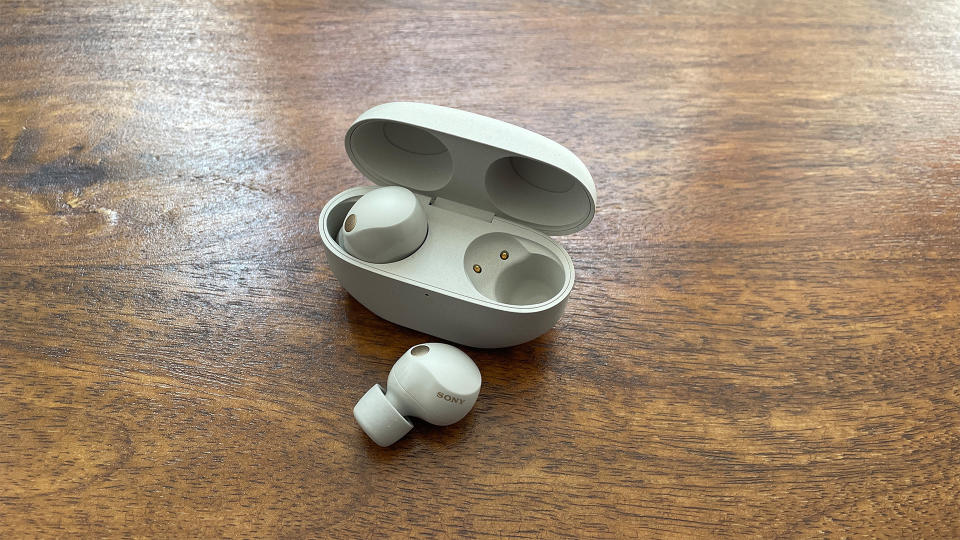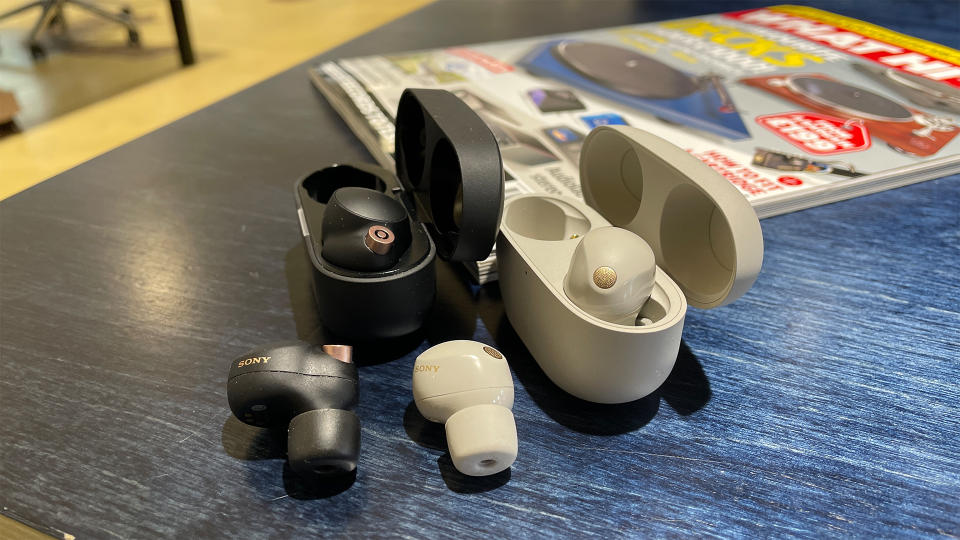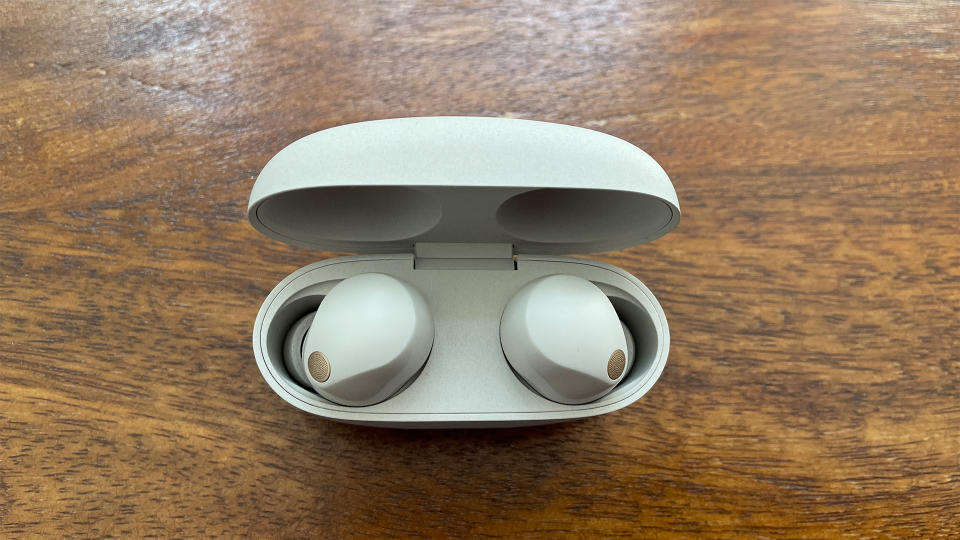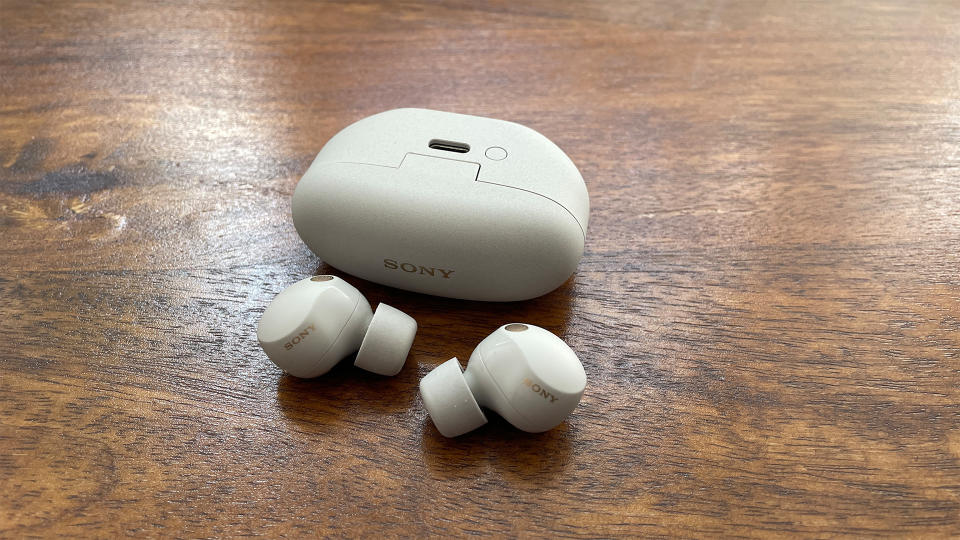Sony WF-1000XM5

We think it’s fair to say that the Sony WF-1000XM5 are, without exaggeration, one of the most eagerly anticipated pairs of wireless earbuds to launch in recent memory.
Why? Well, they’re replacing a two-time What Hi-Fi? Award-winner that has dominated the category since 2021 and set a pace that rivals from Apple and Bose have only recently matched.
Do the WF-1000XM5 push the envelope further? Sony definitely hasn’t been shy in making some big changes to its new top-of-the-line buds, but are they all positive?
Price

The first change concerns pricing. Unfortunately, Sony hasn’t been able to do the same as Apple and its AirPods Pro 2 and keep its new flagship earbuds the same price as their predecessors. So, the WF-1000XM5 are £259 ($299 / AU$TBC) which is up from the £250 ($280 / AU$450) price tag of the previous model, the WF-1000XM4.
This still sees them slot in between the AirPods Pro 2 at £249 ($249 / AU$399) and the Bose QuietComfort Earbuds II at £280 ($299 / AU$429), which keeps them competitive. In case you were wondering, we have spoken to Sony and it has confirmed that the WF-1000XM4 will be discontinued, so stock of the older model will start to become more limited over time.
Design & comfort

The WF-1000XM5 charging case gives the first hint that Sony’s designers have been busy. It’s noticeably smaller than that of its predecessor, and sure enough, flip the top open and you’ll see the shrinkage has spread.
The earbuds really have been trimmed down. Sony claims the WF-1000XM5 are approximately 20 per cent lighter and approx 25 per cent smaller than the WF-1000XM4.
Peeling them out of their charging case is tricky at first, but we soon get the technique nailed down. Most of the exterior of each earbud is a new glossy plastic material that looks and feels premium by modern standards. It’s also super smooth which makes pinching the earbuds to get them out of the case a bit of a struggle. We find pulling an earbud towards you makes it much easier to liberate it from the magnetic housing.
The only section of the earbuds that isn’t glossy is the outer surface used for the touch controls, that leads down to the outer mic arrangement. That gets more of a very finely textured matte finish. Incidentally the touch controls work extremely well, and there’s also a welcome new control feature for the new model, but more on that later.
The Sonys look and feel just as premium as their closest rivals like the Bose QuietComfort Earbuds II and the AirPods Pro 2 and are quite a jump forward compared to the previous model.
Sony WF-1000XM5 tech specs

Bluetooth version 5.3
Codec support SBC, AAC, LDAC
Noise-cancelling? Yes
Battery life 8 hours (BT + ANC), 24 hours (including charging case)
Finishes x2 (black, silver)
The XM5 are less chunky than the XM4, with smoother lines and more subtle curves while the exterior mics are better integrated, making for a smaller, rounder and much less protruding profile. A slender profile also helps reduce the effects of wind noise as gusts pass over the exterior surfaces. The Sonys are IPX4 rated too, for sweat resistance.
Not only do the Sonys look great aesthetically they’re also comfortable and more liveable than the XM4 for longer periods of time.
Being picky, the fit isn’t quite as secure for us as the Bose QuietComfort Earbuds II. The Bose have slender wings that help keep them in place, while the Sonys rely on their polyurethane tips and the “insert and twist” technique. The tip material made its debut on the WF-1000XM4 and it feels like a silicone and memory foam hybrid.
Get the fit right and you get a great seal, but we wish the material was a bit grippier so it doesn’t feel like slightest slippage could break your seal. You get four different sizes of tip in the box, including an ultra-small SS option. Perhaps there’s scope for an XL size in future?
Another big change for the new WF-1000XM5 is the use of a brand new driver. The Dynamic Driver X, as Sony calls it, is 8.4mm, which is quite a bit larger than the 6.4mm unit used in the WF-1000XM4. The larger driver doesn't need to move as much as the smaller one, which Sony claims helps reduce mechanical noise. It also uses two different materials – one for high frequencies and one for lows.
Call quality & noise cancelling

To help improve call quality with the XM5, Sony has approached it from a couple of different angles. Firstly, that new sleeker design incorporates what Sony refers to as a wind noise reduction structure so less noise is generated taking calls in windy environments.
The headphones also use a noise reduction engine with AI machine learning to help maintain clarity, and a bone conductor sensor that detects when you are speaking.
You can now even accept or decline a phone call with head gestures – nod to accept or shake to decline. There’s a little demo in the Headphones App which allows you to experience it and it works surprisingly well, even if it does encourage a few quizzical looks.
In practice, the design and tech changes seem to have done the job. Wind noise is largely subdued, even in the blustery conditions in which we found ourselves during testing. Our voice sounded detailed, clear and easy to follow which isn’t always the case with wireless earbuds.
On to active noise cancelling, and Sony claims to have reduced noise by around 20 per cent in the XM5 compared to the WF-1000XM4. The new model sees three mics used on each earbud (compared to two on XM4) including dual feedback mics to improve the cancelling-out of low frequencies. There’s a new integrated processor V2 (compared to V1 on the XM4) and HD Noise Cancelling processor QN2e.
Comparing the old and new models side-by-side, we concur with Sony's claim. The WF-1000XM5 seem to remove an extra layer of midrange noise in comparison. We think the Bose QuietComfort Earbuds II still have the edge, though. They seem able to suck out more external noise in general, although this does come with the vacuum-like effect that we know not everyone is a fan of. With the Sonys, the effect is much more subtle.
Features

Sony’s DSEE Extreme processing returns in the WF-1000XM5 to try and fill the gaps of detail in low quality music files. There’s hi-res audio and 360 Reality Audio support, which includes, for the very first time, dynamic head tracking. LDAC support is also there for anyone using compatible sources.
You’ll be pleased to know that Multipoint Bluetooth is supported out of the box so you can connect to two devices simultaneously. We had to wait a long time for the same feature to arrive on the WF-1000XM4 so it’s good to see this available from day one. It works well too. We connect to a MacBook Pro and iPhone 12 during testing and seamlessly switch from a phone call to watching a video or playing music.
Adaptive Sound Control and Speak-to-Chat return with the XM5 too. These have become part of the Sony furniture over the years with the former automatically altering the amount of ambient sound filtered into your ears depending on where you are and what you’re doing.
You can register locations where you’d prefer to have ANC powered up, e.g. the gym, and where you’d rather have greater transparency so you can hold a conversation, e.g. the office. They can even learn when to have certain modes enabled too.
One of the biggest and most exciting changes for the WF-1000XM5, though, relates to the scope of the touch controls. You can now operate playback, sound modes and volume all at the same time through the earbuds. With their predecessors, you were restricted to only being able to operate two out of the three at any one time. Now you can change volume by tapping multiple times on either the left earbud (volume down) or right earbud (volume up).
Spotify fans can now fire up the streaming service with a quick double tap instead of having to boot up the Spotify app manually.
Battery life

Battery life comes in at eight hours with Bluetooth and ANC activated, with the wireless charging case providing another 16 hours. During testing we find the Sonys do a good job of living up to the claimed figures, even if it’s a little disappointing that Sony hasn’t moved the game on from the XM4 which offer identical figures on paper. It’s still at the top end of premium noise-cancelling wireless earbuds and compares favourably to the six hours offered by both the Bose QuietComfort II earbuds and the AirPods Pro 2.
Sound

Now, this is where things start to get interesting – really interesting. The Sony WF-1000XM5 sound very different to previous top-of-the-range earbuds from the brand. But is that different in a good way or in a what-the-heck-have-they-done kind of way, we hear you ask? We’re pleased to report it’s the former.
In our opinion, there’s a definite change of character compared to what we’ve experienced when testing previous models. If you’re coming to the XM5 from a pair of WF-1000XM4 we think you’ll notice a difference. The new model doesn’t sound quite as rich or full in the bass but what Sony has managed to achieve as far as clarity and detail go is really rather special.
We start with one of the tougher test tracks in our arsenal, which is 15 Step by Radiohead. You can’t accuse the Sonys of having no rhythmic drive as they power through while managing to keep everything in check. The song can sound like a jumbled mess when listening through poorer-performing earbuds. But the timing of the XM5s is on point as percussion is kept organised and well-defined. The song makes sense all the way through to the end.
The Streets Wouldn’t Have It Any Other Way has a beefy bassline to contend with and the Sonys get the balance of quality and quantity spot on. There’s weight but it’s also wonderfully controlled as it prods and probes. The WF-1000XM5 make their predecessors and the likes of the Bose QuietComfort earbuds sound cloudy and fat. They both produce a greater quantity of bass but the Sonys sound much more balanced.
This track once again hammers home that newfound level of detail. You can feast on the bassline, piano, vocal, backing vocal and percussion individually or as a whole. There’s an openness which we haven’t really heard from wireless earbuds at this level before and the definition and texture that shines through is quite exceptional. In the search for resolution, we feel like Sony has sacrificed a little bit of the fun that was so appealing in their predecessors, but they’re still musical and exhibit a fine sense of timing.
We make the switch to Sam Smith’s I’m Not The Only One and it highlights the strength of Sony's midrange. Every element of the music is thoroughly investigated and exposed. The harmonics of the piano key strikes sound authentic, while the drum thwacks have just enough weight and plenty of texture. Close your eyes and you can even get a feel for how far away or how close the microphone is at various stages of the track.
As is the case with noise-cancelling in a lot of earbuds we’ve tested at various price points, turning off the ANC does actually result in a slightly more natural and balanced delivery. You can hear frequencies being boosted when ANC is turned on, but, thankfully it doesn’t upset the balance. This is something we hear on rival models too, but is just something to be aware of.
Verdict

There’s a lot to wrap your head around with the Sony WF-1000XM5. You’ve got a brand new design to get used to and a tweaked sonic signature. Not only that, but new rivals have driven standards even higher at this level.
The new design is a big positive: they’re comfortable, nice to use and noise-cancelling and call quality are up there with the competition. And if you’re looking for the clearest and most detailed sonic performance on the market right now, then the WF-1000XM5 produce it, and by quite some distance.
They might not sound quite as fun as their predecessors, but move the game on in many aspects of performance. Another success for Sony.
SCORES
Sound 5
Features 5
Comfort 5
MORE:
Read our review of the Bose QuietComfort Earbuds II
Also consider the Apple AirPods Pro 2
Sony WF-1000XM5 vs WF-1000XM4: which noise-cancelling earbuds are best?
Sony WF-1000XM5 vs Bose QuietComfort Earbuds II: which premium buds should you buy?
Read our Sennheiser Momentum True Wireless 3 review
Here are the best wireless earbuds: budget and premium
